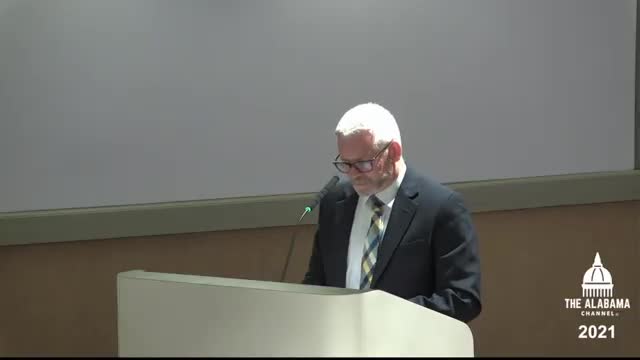Alabama board adopts rule tying FAFSA completion to high-school graduation, with opt-out
Get AI-powered insights, summaries, and transcripts
Subscribe
Summary
After a public hearing with 12 speakers, the Alabama State Board of Education voted to adopt an amendment requiring completion of the Free Application for Federal Student Aid (FAFSA) as a high-school graduation condition, while preserving an opt-out process and directing the department to publish a model waiver form.
The Alabama State Board of Education on April 8 voted to adopt an amendment to the state administrative code that requires high-school seniors to complete the Free Application for Federal Student Aid (FAFSA) as a condition of graduation, while allowing families to opt out.
Board members approved the amendment—adopted as an amendment to Alabama Administrative Code Rule 290-3-1-.0221—after a public hearing that included 12 speakers offering both personal testimonials about FAFSA’s benefits and objections centered on privacy and parental choice. The measure passed on a roll call vote: Chestnut, Ivey, McCarty, McBride, Richardson and West voted yes; Bell, Reynolds and Ziegler voted no.
Supporters told the board that requiring FAFSA completion would increase college enrollment and scholarship access. "The FAFSA opens up several opportunities for high school seniors going into college," said Tamia Kemp, a student at Miles College, describing how Pell Grants and work-study helped her. Several other students and recent graduates said completing FAFSA led to Pell Grants, scholarships and work-study jobs that made college possible.
"FAFSA significantly changed my life," said Amberly Jones, a sophomore at Bishop State Community College, recounting that completing the form helped secure aid that lightened her family's financial burden. Central 6 Alabama Works representatives and local counselors also urged the board to act, saying statewide FAFSA completion rates are low and that the policy would support a statewide workforce goal of increasing credential attainment.
Opponents raised privacy and governance concerns. Dave Weiss, president of the Madison County Board of Education, urged the board to reject the rule, calling it "an incredible overreach of government" and saying the decision should be made by the legislature. State Board member Stephanie Bell, who voted no, said many guidance counselors support FAFSA but object to making it a graduation requirement. "This is not about the merits of the FAFSA," Bell said. "It's about the requirement in order to graduate." She also said the form asks for sensitive personal information and said an opt-out should be easy and widely available.
State Department staff and board supporters said the department will provide resources to ease local implementation. "A couple of other states that have done this have seen a dramatic increase in the number of students applying for aid and going on to college," Dr. Mackey said, urging the board to adopt the rule as a tool to meet Alabama's stated credential goals. Board members discussed and agreed that the department would publish a model opt-out (waiver) form and make it available online.
Votes at a glance - Adopted: Amended Alabama Administrative Code Rule 290-3-1-.0221 (FAFSA requirement). Motion: Dr. McCarty; second: Dr. Chestnut. Vote: Yes — Chestnut, Ivey, McCarty, McBride, Richardson, West (6). No — Bell, Reynolds, Ziegler (3). Outcome: approved. Notes: rule includes opt-out process; State Department to publish a model waiver form and guidance for local districts. - Adopted (earlier): Emergency amendment to remove requirement for student Social Security numbers from enrollment regulations (emergency rule to amend 290-3-1‑0.02). Motion passed unanimously; the board said the change aligns state code with federal law and current practice. - Adopted (routine resolutions): Recognitions, approvals and program actions (Barbara Fenton employee recognition; authorize review of educator preparation at University of Alabama in Huntsville; extend probationary approval at Spring Hill College; extend approval at University of South Alabama). All passed on voice/roll-call votes as recorded; specifics listed in board minutes. - Personnel approvals: Promotion of Angela Martin to deputy state superintendent (pay grade 92, step 18) and hire of Shanthea Washington as assistant state superintendent for evaluation, accountability and support. Both actions were approved; several board members abstained on personnel votes and asked for salary transparency and the state personnel board opinion on approval authority.
What the decision does and next steps The adopted administrative-code language requires students to have a completed FAFSA on file before graduation unless the family submits an approved waiver. The board discussion and public comments made clear the department will publish a model waiver and accompanying guidance to reduce local administrative burden. Board members asked the Alabama State Department of Education to post the opt-out form online and to provide implementation support to local systems.
Why it matters Board members and supporters framed the change as a targeted policy to increase access to federal financial aid and to help Alabama meet its stated goal of growing the number of credentialed residents. Supporters cited research and local counselor experiences showing higher college enrollment for students who complete FAFSA. Opponents warned that the rule potentially intrudes on family privacy and shifts work to local counselors without additional funding.
Implementation and oversight Board members requested the department (and superintendent's office) to publish a model waiver form, provide technical assistance to districts, and track FAFSA completion rates after implementation. The department and speakers noted current statewide FAFSA completion was well below desired targets (Chandra Scott of Alabama Possible cited a statewide completion rate of about 38.3 percent as of March 5, 2021), and supporters argued the rule could raise that figure.
The board's next regular meeting is scheduled for May 13, 2021, at 10 a.m. in the Gordon Persons Building Auditorium; a work session follows.
